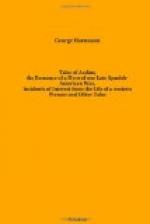a new set of similar papers with the interest compounded
and added to the original debt. Surely Don Guillermo
was conceded to stand highest in popular estimation
of any set of men who had ever come to the Rio Grande.
Had he not shown the people how to do business in a
convenient and easy manner? Under such a system
nobody worried or labored very much and life was like
a pleasant dream. But alas! there has always
been a beginning and an ending to everything under
the sun, good or evil. The awakening from an
easy life’s dream was occasioned by a crushing
blow. It fell on the day of final reckoning,
when Don Guillermo, my good uncle, thought the time
was propitious to realize something tangible on sundry
duly signed, sealed, and witnessed instruments.
There was a rumpus; neither earthquake nor cyclone
would have caused a greater commotion in the community.
What, then, did this lying gringo mean by resorting
to the trickery of the United States law courts and
the power and services of the county sheriff?
Why did he wrest their property from them? Had
this gringo not always accepted their signatures as
a legal tender for the payment of their debts?
Had he not told them time and again that their handwriting
was better than gold? If uncle had fallen into
the clutches of these furious people, he would undoubtedly
have been lynched. But he had wisely disposed
of all his property in the country and had left with
his family for the States. I remained in the
service of the buyer of and successor to his business.
Soon after I began to feel lonesome, restless and
dissatisfied, and that life among the natives was
not as pleasant and satisfactory as formerly may be
easily imagined. In fact, the gringos were now
cordially hated and envied by a certain class, the
element of greatest influence among the people.
This produced a feeling of unpleasantness not to be
overcome, and I resolved to emigrate to California,
overland, by way of Arizona. I longed for the
companionship of people of my own race and wanted to
see more of the world. There was an opportunity
to go to a mining town of northern Arizona, with several
ox-teams which were freighting provisions. The
freighter, Don Juan Mestal, assured me that he was
very glad to have the pleasure and comfort of my company
and would not listen to an offer of remuneration on
my part. He said there was the choice of two
routes; one road passed through the country of the
Navajo Indians and the other road led past Zuhl, the
isolated Pueblo village. Don Juan said that he
would not go by way of Zuni, if he could avoid it,
as he was prejudiced against this tribe. Not
that they were hostile or dangerous, but he had acquired
a positive aversion, amounting to abhorrence, for
those peaceful people when he, as a boy, accompanied
his father on a trading expedition there. At that
time he witnessed the revolting execution of a score
of Navajos who had been apprehended as spies by the
Zunis. These unfortunates came to their village




